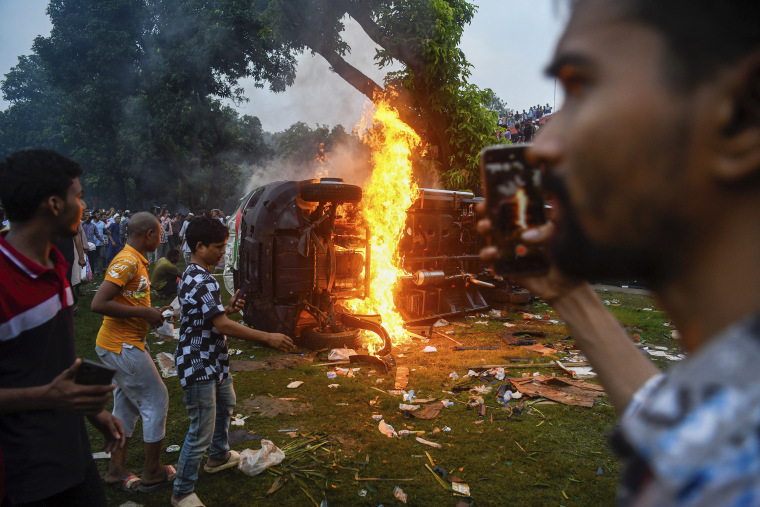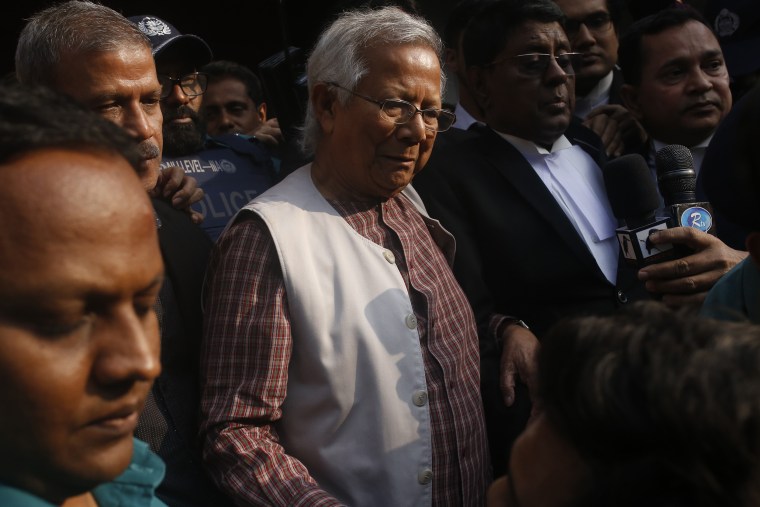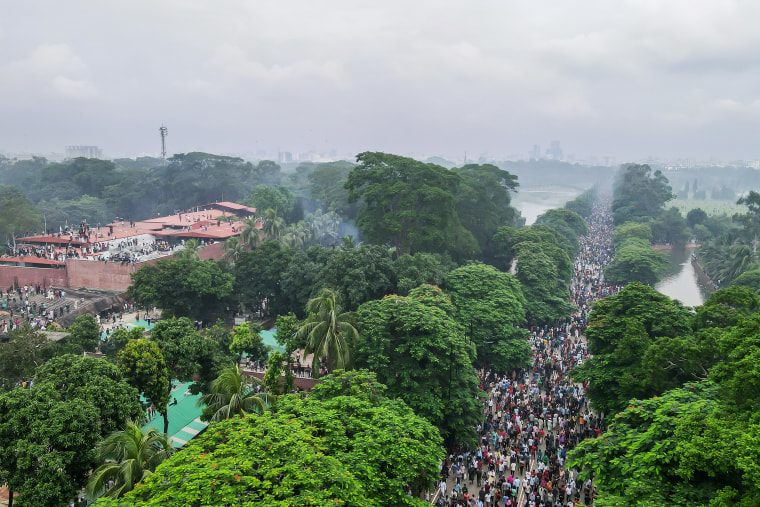DHAKA, Bangladesh — Bangladesh's Parliament has been dissolved, the president’s office said Tuesday, paving the way for an interim government that student protest leaders said should be led by Nobel laureate Muhammad Yunus.
Yunus, 84, who received the 2006 Nobel Peace Prize for pioneering the use of microcredit to alleviate poverty, had faced a slew of what he says are politically motivated legal charges under the government of Prime Minister Sheikh Hasina, who resigned and fled the country Monday after weeks of student-led protests in which hundreds of people were killed.
Though Hasina’s increasingly autocratic rule had strained relations with the U.S. and others, her ouster could deepen instability in the majority-Muslim South Asian nation of 170 million people, which struggles with poverty and high youth unemployment.
More than 100 people were killed in unrest across the country Monday, local media reported, in the deadliest day since the start of protests last month that are estimated to have killed more than 400 in total. On Monday evening, enraged people scaled and defaced a statue of Sheikh Mujibur Rahman, Hasina’s father and the country’s first president, who led the Bangladeshi independence movement against Pakistan in 1971.
Angry crowds that blamed police for the government’s violent crackdown on protesters surrounded a number of police stations in Dhaka, the capital, throwing stones and setting fires in a campaign police say has left them incapacitated. Homes, offices and businesses belonging to people viewed as Hasina supporters were also attacked.

On Tuesday, the streets of Dhaka were littered with debris, burned-out cars and remnants of makeshift barricades, while the smell of fires lingered in the air. Civilian volunteers took it upon themselves to direct traffic in the city of 23 million until the police returned.
Abdullah Noman, a university student who took part in the protests, said he “couldn’t just stand by and watch everything fall apart.”
“People need to get to work, to hospitals, and there’s no one else to help. If we don’t step up, who will?” he said as he stood at the bustling intersection of Bijoy Sarani. “The city is in chaos, and we have to do what we can to keep things moving.”
Army Chief Gen. Waker-Uz-Zaman, who announced Hasina’s resignation Monday, was set to meet Tuesday with student protest leaders who demanded that Parliament be dissolved by 3 p.m. (5 a.m. ET), urging “revolutionary students to be ready” if the deadline was not met.
“Any government other than the one we recommended would not be accepted,” Nahid Islam, 26, one of the key organizers of the student movement, said in a video on Facebook.

Islam said the students had shared their plans with Yunus and that “he has agreed to take on this responsibility at our invitation.”
Yunus, who supported the protests and told Indian media that Monday was Bangladesh’s “second liberation day,” did not respond to an NBC News request for comment from his Dhaka-based Yunus Centre.
Yunus would be more of a “figurehead,” said Chietigj Bajpaee, a senior research fellow for South Asia at the London-based Chatham House, and his leadership would give “some amount of credibility to the interim government.”
Regardless, he said, officials in Washington will be closely monitoring the situation in Bangladesh, which is considered “a beneficiary of the push to diversify away from China.”
“There are underlying geopolitical concerns that future Bangladesh doesn’t become more beholden to Beijing,” he said.
The crisis could also have implications for neighboring India, which is seen as having long supported Hasina and where she fled Monday.
Yunus told Indian news channel Times Now that people in Bangladesh were “angry at India because you are supporting the person who destroyed our lives.”
Indian Foreign Minister Subrahmanyam Jaishankar told lawmakers Tuesday that Hasina had requested approval to travel there “at very short notice” and that border security had been increased.
He did not say how long Hasina would be in India or what she planned to do next.
Hasina, 76, who was Bangladesh’s longest-serving leader, won her fourth straight term in January in an election that was boycotted by the opposition and described by the U.S. as neither free nor fair. Though the protests began over a controversial quota system for highly coveted government jobs, they soon morphed into broader calls for justice for those killed as well as Hasina’s resignation.
On Monday, the State Department said the U.S. stands with the people of Bangladesh and urged all parties to refrain from further violence as an interim government is formed.
“Too many lives have been lost over the course of the past several weeks, and we urge calm and restraint in the days ahead,” spokesperson Matthew Miller said at a news briefing in Washington.

Bangladesh President Mohammad Shahabuddin said Tuesday that Hasina’s archrival, Begum Khaleda Zia, 78, of the opposition Bangladesh Nationalist Party had been released from house arrest after being convicted in a corruption case in 2018.
He said the estimated 11,000 people who had been arrested since July 1 would be unconditionally released as well.
Anger over the arrest and treatment of protesters appeared to motivate the crowds that targeted police stations Monday. Eyewitnesses described scenes of chaos and fear as officers tried to control the situation by firing in the air and deploying tear gas.
“I saw people being shot and carried to the hospital,” Tushar Abdullah said. “It was like a war zone. People were screaming, running in all directions. I felt completely helpless.”
Senior police officials confirmed that many personnel had evacuated their stations because of the threat of attacks.
“We were instructed to secure our weapons and essential documents and then leave,” said Mohammed Nura Alam, an assistant sub-inspector from Gulshan Division. “The situation was too dangerous. We had no choice but to abandon our posts.”
In a statement Tuesday, Bangladesh police said the country was “passing through an unprecedented crisis.”
“The police force is now without any leadership as the accused have gone into hiding. Junior members, who are mostly innocent, are currently in harm’s way,” said Md Sohel Rana, additional deputy inspector general of the Police Staff College.
“At a time like this, I urge everyone to show restraint and refrain from harming us and destroying public property,” he said.
The absence of police has left some Dhaka residents feeling vulnerable and anxious.
“I’ve never seen anything like this in my life,” said Rafiqul Islam, 60, who was wandering around Karwan Bazar. “The city is in chaos because of the opposition party’s mobs who are out taking vengeance. There’s no one to protect us. It’s terrifying.”
Mehedi Hasan Marof reported from Dhaka, Bangladesh, and Mithil Aggarwal from Hong Kong.
